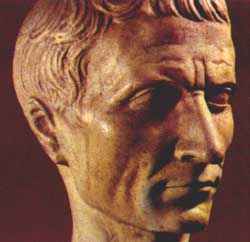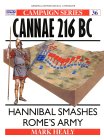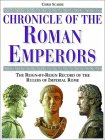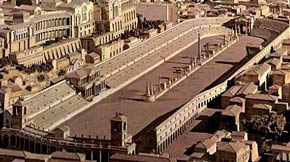Wars in Gaul
Gaul as a whole consisted of a multitude of states of different ethnic origin. In the Iron Age, their different cultures had started to resemble each other, largely by processes of trade and exchange. The Greeks and Romans called all these people Celts or Gauls. In the fourth century, Gallic warriors had settled along the Po and had invaded Central Italy (capturing Rome in 387). Most people in Italy were afraid of new Gaulish invasions.
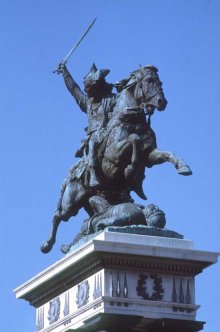 In the second century mass migrations from Germans had started, for reasons that are unclear. Marius had defeated some of their tribes (the Teutones and the Cimbri), but in Caesar's days it was probably not a gross exaggeration to say that the states of Gaul would have to become Roman or would be overrun by Germans, who would proceed to attack Italy. If the Romans were afraid of the Gauls, the were terrified of the Germans. In Caesar's propaganda, an invasion of Gaul was a preventive war. Maybe Caesar was not blind to trade: the Rhone-Saone-Rhine- corridor was the most important trade route in pre-industrial Europe and a taste for Roman luxuries had already started in the Gaulish states along the Rhone and Saone. British tin was traditionally transported along the rivers Garonne and Seine.
Caesar's military base was the valley of the Rhone, which had been Roman from 123 onwards. In the valley of the Saone, the Aedui were faithful allies. When Caesar became governor of this region, the Helvetians (a nation in modern Switzerland) had decided to invade the region along the Rhone and Saone, and it was obvious to Caesar that if he was able to defeat these roaming Germans, he could impress the Senate. Besides, a victory over the Germans would place him on the same rank as his uncle Marius. This is exactly what happened: after raising two extra legions, he defeated the Helvetians, once when they were crossing the Saone and a second time in the neighbourhood of the capital of the Aedui, Bibracte. After these victories, the Gauls are said to have asked Caesar to help them pushing back Germans, who had crossed the Rhine and settled in Alsace. Again, Caesar was victorious, and winter quarters were built in the neighbourhood of the battle field, in modern Besancon.
In the second century mass migrations from Germans had started, for reasons that are unclear. Marius had defeated some of their tribes (the Teutones and the Cimbri), but in Caesar's days it was probably not a gross exaggeration to say that the states of Gaul would have to become Roman or would be overrun by Germans, who would proceed to attack Italy. If the Romans were afraid of the Gauls, the were terrified of the Germans. In Caesar's propaganda, an invasion of Gaul was a preventive war. Maybe Caesar was not blind to trade: the Rhone-Saone-Rhine- corridor was the most important trade route in pre-industrial Europe and a taste for Roman luxuries had already started in the Gaulish states along the Rhone and Saone. British tin was traditionally transported along the rivers Garonne and Seine.
Caesar's military base was the valley of the Rhone, which had been Roman from 123 onwards. In the valley of the Saone, the Aedui were faithful allies. When Caesar became governor of this region, the Helvetians (a nation in modern Switzerland) had decided to invade the region along the Rhone and Saone, and it was obvious to Caesar that if he was able to defeat these roaming Germans, he could impress the Senate. Besides, a victory over the Germans would place him on the same rank as his uncle Marius. This is exactly what happened: after raising two extra legions, he defeated the Helvetians, once when they were crossing the Saone and a second time in the neighbourhood of the capital of the Aedui, Bibracte. After these victories, the Gauls are said to have asked Caesar to help them pushing back Germans, who had crossed the Rhine and settled in Alsace. Again, Caesar was victorious, and winter quarters were built in the neighbourhood of the battle field, in modern Besancon.
Caesar spent his winter in Cisalpine Gaul, having an eye on the city of Rome and giving orders to Piso. Until now, the wars in Gaul had been successful, but not special. During the winter of 58/57, Caesar must have conceived larger plans, and rumours that the Belgians had decided to attack the Roman invaders were a good excuse to conquer all states in Gaul. Again, Caesar raised two legions, and together with the other troops, he surprised the Belgian nation of the Remi, who lived in modern Reims. His presence prevented the Remi from taking part in the Belgian attack on the Romans, and as it turned out, the Remi even sided with Caesar. As a result, the other Belgians decided to attack a Remian town that was situated on the boards of the river Aisne. Caesar, however, defended the town, and then stroke at the Belgian tribe of the Nervians, who lived along the Somme. In a battle, they were annihilated: barely 500 of their army of 60,000 survived. Along the Sambre and the Meuse, the Romans inflicted comparable losses upon the Aduatuci in two battles. During the same year, a smaller Roman army had gone to the west of modern France, and demanded subjection of the nations in Normandy and Brittany. After his Belgian campaign, Caesar's army followed, and winter quarters were established along the Loire. Meanwhile, in Rome, public thanksgiving lasting fifteen days were decreed by the Senate: no one had been granted this honour before.
Now that all Gaul had at least nominally submitted to Rome, Caesar spent the winter in Illyricum, but when he had crossed the Alps, the Gauls from Brittany rose against the Romans (56). Caesar ordered ships to be built, and spent some time in Italy, where he met Pompey and Crassus in Lucca: the triumvirs decided to continue their conspiracy against the Roman Republic and agreed that Caesar's generalship in Gaul would be prolonged until 50, December 31. This was an extraordinary command, and Caesar's fellow-conspirators demanded in return Caesar's support to be consuls in the next year, 55. Caesar agreed, and having secured his position, he crossed the Alps and in the summer a naval battle took place, in which the Bretons were defeated. Caesar's colonels took charge of mopping up expeditions in Aquitaine and Normandy.
Next year, Caesar accomplished two feats that must have shaken his Italian audience with excitement. First, Caesar's engineers bridged the Rhine, showing the Germans that the Romans were invincible. Actually, the destruction of German towns was little short of terrorism. Having impressed the Germans, the Gauls, and the Senate, Caesar turned to the west, where a large fleet was ready to carry Caesar's armies to Britain, where a short campaign took place. Even though the Britons were backward and still retained the primitive social system of chiefdoms (i.e., there were no states), the senate was duly impressed by the general who had reached the edges of the earth. The consuls in Rome, Crassus and Pompey, were compelled to decree a thanksgiving of twenty days.
In 54, Caesar invaded Britain again. He defeated the chief of the Britons, Cassivellaunus, in a battle near modern London and crossed the Thames. In Essex, some scientific experiments were carried out: from measurements with a water clock, Caesar's explorators learned that the nights in Britain were shorter than on the continent. After this expedition, winter quarters were build among the Belgians.
In the winter of 54-53, Caesar was faced with a serious crisis, as the winter camps were built too far from each other. Two legions were annihilated by a rising, led by Ambiorix. Though Caesar remained in control, it was obvious that Gaul was anything but conquered. Another cloud appeared on the horizon: from Rome came the message that Julia had died. As her father Caesar will have mourned his daughter, but as a politician he must have understood that the friendship with Pompey was no longer certain.
When the uneasy winter was over, Caesar must have decided to teach the Belgians a lesson for once and for all. The Nervians, who had already been decimated, were victims of naked aggression, after which the Menapii in the marshlands along the Rhine experienced the same horrors. (When this genocide became known in Rome, Cato exclaimed that Caesar ought to be handed over to the Germans.) A second Rhine crossing followed, and German tribes were forced to go with the current to the empty country of the Menapii (later, these migrants were known as Batavians). After these atrocities, winter quarters were build between the Seine and the Loire.
52 saw an even more serious rising than that of the winter of 54/53. For the first time, almost all nations in Gaul united under one commander, Vercingetorix. Only the Belgians, still lamenting the disaster of the year before, remained aloof. Caesar was forced to defend himself: he had to recall his armies from the north, and meanwhile tried to hold the south. Vercingetorix decided to drive away the Romans by cutting them off from forage and supplies: the Gauls therefore destroyed their towns, and stored everything in a few impregnable towns. Their army would attack the Romans when they laid siege to these strongholds. This tactic would force the Romans back from Gaul into the Provence. However, the Romans managed to take Bourges, killing 39,000 Gauls. The Gauls remained optimistic, and even the Aedui, Caesar's allies, rebelled. Soon after their insurgence, the Romans failed to take Gergovia. Meanwhile, the legions from Belgium on their way to the south found their ways barred by the Gauls, but in Paris, they crossed the Seine and three days later they contacted Caesar's defeated army. Having his armies united, Caesar was able to block Vercingetorix in a formidable fortress called Alesia. This site was too high to be stormed, so Caesar had to starve his enemies, who had lots of food.
The Romans decided that they could wait, and built enormous fortifications (the remains of which have survived). First, they build one line to keep in 80,000 Gauls; then, a second line to defend the Romans against 240,000 warriors of the Gaulish rescue force, that was besieging the besiegers. Terrible things happened: the Gauls sent away their wives and children, and the Romans refused to let them pass their lines. They were starved to death between the lines. In the end, Roman fortifications proved superior to Gaulish numbers, and Vercingetorix surrendered.
The whole of Gaul was now conquered. Three million people had been living in Gaul before Caesar arrived in 58; one million had been killed and one million had been sold as slaves when he left in 50. Caesar himself wrote in his Commentaries on the War in Gaul that peace had been brought to the whole of Gaul. It is not hard to see that this was the peace of a graveyard.


|

